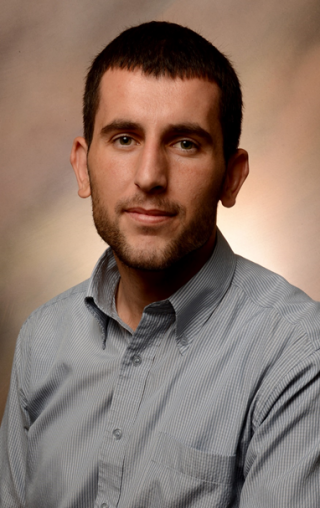MEET YOUR FULBRIGHTER
Food Banks: Blend Frangu’s Story
Blend Frangu (23) describes himself as industrious, hardworking and very loyal to his responsibilities. It is this inspired and go-getting attitude that leads Frangu to be determined to succeed. Frangu, who is Kosovan is intent on being a social entrepreneur; with the aim to develop and improve the lives of marginalized populations in his home country of Kosovo. Before gaining his Fulbright Scholarship to study for his MSc in Agricultural Economics here at the University of Arkansas, Frangu, at the young age of 18 and while still in high school received a financial grant from Swiss Cooperation in Kosovo and Ministry of Foreign Affairs of Denmark to start a strawberry based project on 0.20 hectares of land. He explains when he won the grant through a high school business plan competition held in 2011 in his country and organized by Swiss Cooperation and Ministry of Foreign Affairs of Denmark, who at the time aimed at finding ambitious individuals who proudly want to increase the number of Made In Kosovo products.
Frangu specializes in Agricultural Economics and believes that Agriculture as a career has received a negative reputation one associated largely with back breaking duties and activities. Over the years and with the notion of urbanization populations have also since resorted to life in the bigger cities and have left the rural lands and farms. He however insists that this field is exciting and a necessity to any world economy particularly now with the global outcry for food security. As an Agriculture Economist, his role will be that of an agricultural policy analyst thereby giving him the capacity to impact people’s lives in a meaningful manner. He points out that there is a lot of integration among countries in his region especially in regards to guiding Agricultural policies hence the need for him to be aware of leading and regional agricultural activity, “It is important for me to understand what my peers in my industry are doing, to have some type of intellectual synergy. This enables us to create synergies and work towards one common goal, in my case improving Kosovo’s economic future.”
In respect to technological advancements this budding economist believes he is privileged to have the opportunity to be in the US which he considers the prime location for benchmarking and sharing best practice methods. One such innovative idea he has seen in the USA and which he hopes to replicate and adapt to his home-country of Kosovo is the notion of Food Banks, “I have already seen some food warehouses and I want to use my stay here to fully understand Food Banks and how they operate in terms of reaching the most-needy groups. I want to introduce this idea and apply it to the seven main regions in Kosovo.” Frangu thinks Food Banks will also be perfectly placed in developing countries like Kosovo because the poverty and unemployment levels are higher which therefore indicates that the demand for the service will be there.
One of his major aims is to introduce a food policy in his home country one that will improve the overall nutritional content of food provided to the masses such as in the context of a Food Bank. This is to encourage healthier eating habits. He acknowledges that this may be a difficult feat to reach seeing as healthy food is generally harder to find but he never shies away from a challenge. Frangu emphasizes in closing that internationally food prices have been going up and natural resources are depleting. When he couples this with shrinking national budgets he can foresee that the demand for food will continue to rise and pose a problem which will need concerted efforts to overcome.
—
The writer: Boitshepo Balozwi (38) is a Fulbright Scholar placed at the University of Arkansas for her MA in Journalism, with a focus on Investigative Journalism. Balozwi was the first female editor of The Midweek Sun newspaper published weekly in Gaborone (Botswana). She also has a passion for creating awareness on issues of HIV/AIDS and health particularly as it relates to the most highly affected group – women and girls.
